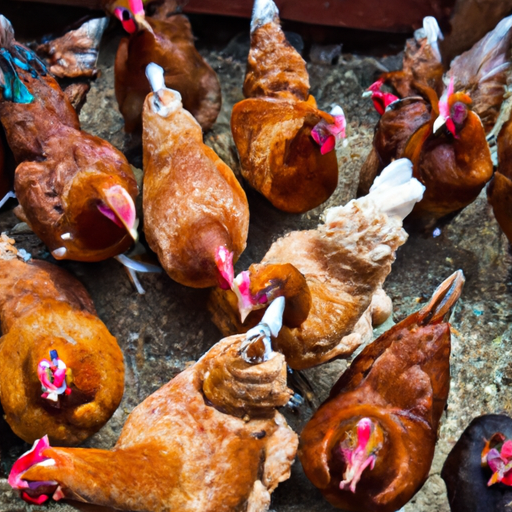Managing a large flock of over 50 chickens comes with its own set of considerations that are crucial for the well-being and productivity of your feathered friends. From space requirements to feeding routines, and from disease prevention to social dynamics, there are several factors to take into account when it comes to efficiently managing your large flock. In this article, we will explore the essential considerations that will help ensure the health and happiness of your chickens while maximizing their potential for providing you with fresh eggs and companionship. So, let’s dive right into it and discover how you can best care for your bustling flock of feathered friends!
Benefits of Managing Large Flocks
Reduced cost per bird
Managing a large flock can bring several benefits, one of which is a reduced cost per bird. When you have a larger number of chickens, the cost of feed, housing, and other resources can be distributed among more birds, resulting in a lower cost per individual. This can be especially advantageous for commercial poultry operations, where cost efficiency is crucial.
Increased efficiency
Another benefit of managing large flocks is increased efficiency. With a larger number of birds, you can streamline your operations and achieve economies of scale. Tasks such as feeding, watering, and cleaning can be done more efficiently when performed on a larger scale. Additionally, the management of health issues and the implementation of biosecurity measures can be carried out more effectively when dealing with a larger flock.
Better utilization of resources
Managing large flocks allows for better utilization of resources. Instead of having to allocate specific resources to a smaller number of chickens, you can make the most out of your available space, equipment, and supplies when you have a larger flock. This can lead to improved productivity and overall effectiveness in managing your poultry operation.
Husbandry Practices for Large Flocks
Proper housing
Proper housing is crucial when managing large flocks. The housing should be spacious enough to accommodate all the birds comfortably, allowing them to move, roost, and engage in natural behaviors without overcrowding. Adequate ventilation and temperature control are also important to maintain a healthy environment for the birds.
Feeding and watering
Feeding and watering large flocks requires careful planning and management. Ensure that all birds have access to feed and water, ideally through a well-designed feeding and watering system that can accommodate the number of birds in the flock. Regular monitoring of feed consumption and adjustment of feeding strategies may be necessary to promote optimal nutrition and prevent wastage.
Health management
Proper health management is essential when dealing with large flocks. Implementing biosecurity measures, such as limiting access to the premises and practicing good hygiene protocols, can help prevent the introduction and spread of diseases. Additionally, vaccination programs and regular health checks by a veterinarian are vital to ensure the well-being and disease resistance of the flock. Proper parasite control measures should also be in place to minimize the risk of infestations.
Choosing the Right Breed for Large Flocks
Productivity
When managing large flocks, choosing the right breed of chickens is crucial for maximizing productivity. Look for breeds that are known for their high egg production or meat yield, depending on the purpose of your flock. Some breeds have been selectively bred to excel in specific traits, so consider your production goals when selecting the breed.
Adaptability to climate
Consider the climate in your area when choosing a breed for a large flock. Some breeds are more resilient and adaptable to varying weather conditions, while others may be more sensitive to extreme temperatures or humidity. Selecting a breed that is well-suited to your local climate can help ensure the health and comfort of your flock.
Resistance to diseases
Disease resistance is another important factor to consider when managing a large flock. Some breeds have a higher natural resistance to certain diseases, which can reduce the risk of outbreaks and the need for extensive medical interventions. Consult with local experts or poultry specialists to identify breeds that have a reputation for disease resistance in your region.
Housing Requirements for Large Flocks
Sufficient space
Large flocks require ample space to thrive. The housing should provide enough room for all the birds to move around freely, engage in natural behaviors, and establish a pecking order without overcrowding. Overcrowding can lead to stress, aggression, and the spread of diseases. Guidelines for the amount of space required per bird vary depending on the breed and purpose of the flock, so consult reliable sources or seek expert advice for specific recommendations.
Ventilation and temperature control
Proper ventilation and temperature control are essential for the health and well-being of large flocks. Good airflow helps remove moisture, odors, and harmful gases, while also regulating temperature and humidity levels. Adequate insulation and ventilation systems, such as fans or air vents, can help maintain optimal conditions inside the housing, keeping the birds comfortable and minimizing the risk of respiratory problems.
Nesting and roosting areas
Providing suitable nesting and roosting areas is crucial for large flocks. Nesting boxes should be clean, adequately sized, and located in a low-stress environment to encourage hens to lay eggs in designated areas. Roosting bars or platforms should be provided at an appropriate height and have enough space for all the birds to rest comfortably. Well-designed nest boxes and roosting areas contribute to the overall welfare and productivity of the flock.
Managing Feeding and Watering for Large Flocks
Access to feed and water
Ensuring that all birds have easy access to feed and water is essential for managing large flocks. Implementing a feeding and watering system that can accommodate the number of birds and promote equal access to resources is crucial. Adequate feeder and waterer space should be provided, and it’s important to regularly check that all birds can reach the feed and water without competition or exclusion.
Monitoring consumption
Monitoring the consumption of feed and water in large flocks can help identify any potential issues or imbalances in nutrition. Regularly measuring feed and water intake can provide insights into the flock’s health, as a sudden decrease or increase in consumption may indicate a problem. This information can guide adjustments in feeding strategies and ensure that the birds receive adequate nutrition for optimal growth, production, or maintenance.
Strategies for efficient feeding
Efficient feeding practices are important for managing large flocks. Consider using feeders and feed storage systems that minimize waste and protect the feed from contamination. Implement a feeding schedule or routine to establish consistency and prevent overfeeding or underfeeding. Providing appropriate feed formulations for the specific needs of your flock, such as starter, grower, or layer feed, can also optimize growth and production.
Effective Health Management for Large Flocks
Biosecurity measures
Implementing biosecurity measures is crucial for effective health management in large flocks. Restrict access to the premises to authorized personnel only, and establish protocols to prevent the introduction of diseases through vehicles, equipment, or visitors. Practice good hygiene, such as regularly cleaning and disinfecting housing and equipment, to minimize disease transmission. Isolating new birds before introducing them to the main flock and practicing proper waste management are also essential biosecurity measures.
Vaccination programs
Developing and maintaining a vaccination program is vital for the health and disease prevention of large flocks. Consult with a veterinarian or poultry health specialist to identify the appropriate vaccines for your specific region and flock needs. Implementing a proper vaccination schedule and ensuring accurate administration can help protect the flock from common diseases and reduce the risk of outbreaks.
Parasite control
Regular parasite control is necessary for managing large flocks. Internal and external parasites, such as worms, mites, and lice, can negatively impact the health and productivity of the birds. Establish a parasite control program that includes regular monitoring, appropriate treatment methods, and proper waste management practices. Consult with professionals to determine the most effective and suitable options for parasite prevention and control in your flock.
In conclusion, managing large flocks of chickens requires careful consideration and planning. Understanding the benefits, implementing proper husbandry practices, choosing the right breed, providing suitable housing, managing feeding and watering, and implementing effective health management strategies are all important aspects of successful flock management. By considering these factors and implementing appropriate measures, you can ensure the well-being, productivity, and profitability of your large chicken flock.




